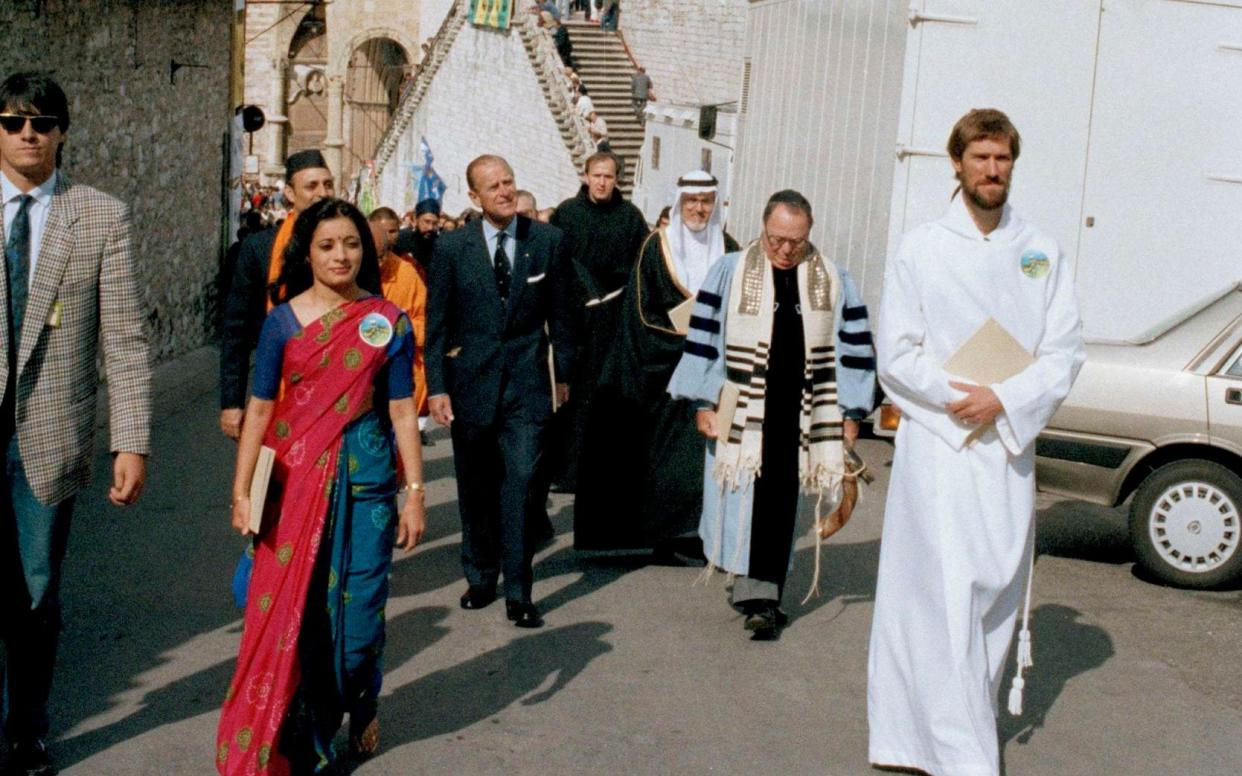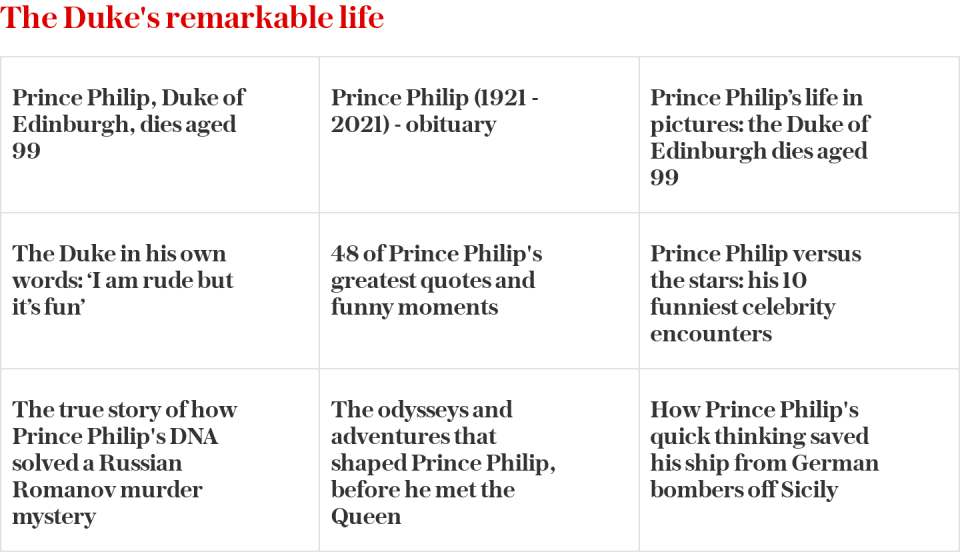How Prince Philip brought religions together at historic summit to 'protect the created world'

- Oops!Something went wrong.Please try again later.
- Oops!Something went wrong.Please try again later.
Prince Philip’s coordination of landmark global interfaith summits made him “the inspiration for the largest civil society movement in the world”, friends have said.
The Duke of Edinburgh, who nurtured a strong Christian faith, was a passionate advocate for interfaith dialogue.
He used his personal faith, connections with other royal families, and his platform to encourage global religious leaders to work together and protect “the created world”, organising summits which paved the way for contemporary policy and action on conservation.
Following his death, religious leaders, charities and organisations have paid tribute to his interfaith work.
The Archbishop of Canterbury, the Most Rev Justin Welby, paid tribute to the prince, saying: “The legacy he leaves is enormous… his work with countless charities and organisations reflected his wide-ranging, global interests in topics including wildlife, sport, design, engineering and interfaith dialogue.”
Chief Rabbi Ephraim Mirvis also offered his condolences to the Royal family following the loss of the “selfless and loyal public figure”, adding: “We remember the Duke’s interaction with, and affection for, the Jewish community in the UK and his connection with Israel, where his mother is buried and which he visited in 1994.”
It was in 1986 that Prince Philip prompted global change by encouraging religious leaders to work together. He took it upon himself to ask leaders of the five major world religions – Buddhism, Christianity, Hinduism, Islam and Judaism – to come and discuss how their faiths could help save the natural world.
For the first time, global faith leaders and leading environmental bodies met in Assisi, Italy, and discussed how they could work together.
Each participant had been given a special invitation: “Come, proud of your own tradition, but humble enough to learn from others." And this applied as much to the secular environmental groups as it did to the great faiths.
Following the historic summit, the prince continued working with each major faith group on an array of conservation projects. However, it was just under a decade later, in 1995, that he solidified his commitment to environmental interfaith initiatives with the founding of the Alliance of Religions and Conservation (ARC) in Windsor Castle.
By this time, the original five faiths had been joined by four others – the Baha’is, Daoists, Jains and Sikhs – and ARC became the only organisation which linked the secular worlds of conservation and ecology with major religions.
In 2002, Prince Philip explained the purpose of ARC, saying: "We desperately need the conviction of religious belief to guide us in the way we live on, and use, the planet.
"We have got to learn to balance the economic and scientific realities against the religious demands for responsibility and consideration for the created world. It is not going to be easy, but I am sure that belief and conviction are very powerful motives to care for our planet with all its diversity."
It was agreed in 1996 that ARC would exist only for as long as it took to put religion on the agenda of major secular environment groups, and environment on the agenda of major world religions. It ran until 2019, after raising the profile of environmental issues in both the religious and secular communities across governments and throughout the world.
Even in his retirement, Prince Philip retained a close interest in the work started by ARC and continued by FaithInvest.
The UK-based international NGO was founded following the dissolution of ARC to empower the faiths to invest for the benefit of people and planet. It paid tribute to the prince, describing him as “the inspiration for the largest civil society environmental movement in the world”.
“His Royal Highness was the first world leader to understand that the religions of the world could be natural partners for the conservation movement,” Martin Palmer, FaithInvest’s CEO and Prince Philip’s religious advisor on conservation right up to the time of his death, said.
“Put simply, it was his vision to bring the faiths together with not just WWF but all the major environmental organisations. It was his absolute conviction, when it was not fashionable to have such a conviction, that religions are vital forces for a sustainable planet, and that secular environmentalists needed to work with them.”
The event not only inspired the faiths to embrace the environment as a religious issue, but also launched tens of thousands of faith-led environmental initiatives globally. It led to the creation of several organisations including ARC, as well as faith environmental groups such as EcoSikh, Bhumi Global, Daoist Ecological Temple Association and others.
Mr Palmer added: “We were last in touch at the beginning of January. He was excited to hear that we were working with hundreds of faith organisations to help them develop faith long-term plans to be launched later this year ahead of the UN’s COP26 climate conference.
“These plans build on a programme, Faith Commitments for a Living Planet, that he launched at Windsor Castle in 2009 with the then UN Secretary-General Ban Ki-moon, which have profoundly shaped the faiths’ response to the environment over the last decade.
“We had hoped to be able to celebrate yet another major programme with him, but now will do so in his honour.”

As well as his passion for conservation and the natural world, the late Duke of Edinburgh also used his expertise in interfaith dialogue to make advances in the world of business and publishing.
In 1984, Prince Philip began holding a series of consultations with Prince Hassan bin Talal of Jordan. Figures from Christianity, Islam and Judaism as well as academics and business figures also took part in discussions on an interfaith code of ethics for international business, formed in the light of the religious traditions of the three monotheistic faiths.
After a final meeting in Amman, Jordan, in 1993, The Interfaith Declaration – which acts as a code of ethics on international business for Christians, Muslims and Jews – was officially promulgated at St James's Palace in London a year later.
In 1989 the prince also launched the first sacred literature trust, a publishing venture aiming to translate into English key texts of the world's most important religions.

